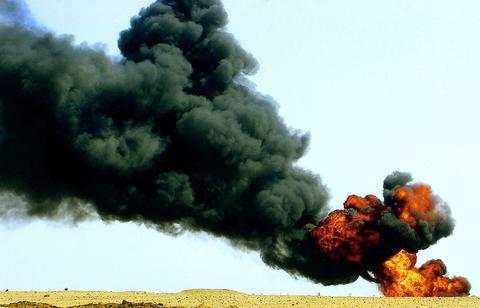Shiite militiamen and Iraqi authorities fought for control of the police headquarters in the holy city of Najaf yesterday in the first skirmishes since a recent agreement to end weeks of bloody clashes. Four Iraqis were killed and 13 were injured, hospital and militia officials said.
Gunmen loyal to radical cleric Moqtada al-Sadr attacked the station near the city's Revolution of 1920 Square after authorities tried to arrest suspected thieves, police and witnesses said. Al-Sadr's spokesman, Qais al-Khazali, said the police shot first and that militia leaders are trying to persuade fighters to lay down their weapons.
Al-Khazali said that two of al-Sadr's followers were killed and several were injured.

PHOTO: AP
US troops were not involved, police said. However, al-Sadr's militia see the Iraqi police as being collaborators with US forces.
The fighting comes only days after al-Sadr agreed to send his fighters home and pull back from the Islamic shrines in Najaf and its twin city of Kufa, handing over security to Iraqi police. The US Army also agreed to stay away from the holy sites to give Iraqi security forces a chance to end the standoff.
In northern Iraq, saboteurs blew up a key oil pipeline earlier Wednesday, forcing a 10 percent cut on the national power grid as demand for electricity rises with Iraq's broiling summer heat.
The pipeline blast near Beiji, 250km north of Baghdad, was the latest in a series of attacks by insurgents against infrastructure targets, possibly to shake public confidence as a new Iraqi government prepares to take power June 30.
As world leaders applauded their newfound unity in passing a UN Security Council resolution on Iraqi sovereignty, Iraq's Kurdish leaders protested that the US and Britain refused to include an endorsement of the interim constitution in the UN resolution. The Kurdish leaders expressed fears they would be sidelined politically by the Shiite Arab majority.
UN diplomats said the decision was made to keep a reference to the interim constitution -- the Transitional Administrative Law -- out of the resolution to appease Iraq's most influential Shiite cleric, Grand Ayatollah Ali al-Husseini al-Sistani, who grudgingly accepted the charter when it was approved in March.
Barham Salih, 44, of the Patriotic Union of Kurdistan (PUK) and a US favorite, announced Wednesday he would not accept the post of deputy prime minister for national security unless the powers were spelled out "appropriate to the position, sacrifice and important role of the Kurdish people," the PUK's KurdSat television reported.
US and other multinational forces will remain in Iraq after the new government takes power at the end of the month under terms of the UN resolution.
Prime Minister Iyad Allawi described the vote as a victory for Iraq because it declares an end to the military presence when a constitutionally elected government takes power in 2006 -- or before, if the Iraqi government requests it.
"The resolution is very clear that once Iraq stands on its feet, then we would ask the multinational forces to leave Iraq," Allawi said.
"This is ... an entirely a government issue," Allawi said.
At the Group of Eight summit in the US, French President Jacques Chirac raised objections to US President George W. Bush's proposal for a wider but unspecified role for NATO in post-occupation Iraq.

VAGUE: The criteria of the amnesty remain unclear, but it would cover political violence from 1999 to today, and those convicted of murder or drug trafficking would not qualify Venezuelan Acting President Delcy Rodriguez on Friday announced an amnesty bill that could lead to the release of hundreds of prisoners, including opposition leaders, journalists and human rights activists detained for political reasons. The measure had long been sought by the US-backed opposition. It is the latest concession Rodriguez has made since taking the reins of the country on Jan. 3 after the brazen seizure of then-Venezuelan president Nicolas Maduro. Rodriguez told a gathering of justices, magistrates, ministers, military brass and other government leaders that the ruling party-controlled Venezuelan National Assembly would take up the bill with urgency. Rodriguez also announced the shutdown

Civil society leaders and members of a left-wing coalition yesterday filed impeachment complaints against Philippine Vice President Sara Duterte, restarting a process sidelined by the Supreme Court last year. Both cases accuse Duterte of misusing public funds during her term as education secretary, while one revives allegations that she threatened to assassinate former ally Philippine President Ferdinand Marcos Jr. The filings come on the same day that a committee in the House of Representatives was to begin hearings into impeachment complaints against Marcos, accused of corruption tied to a spiraling scandal over bogus flood control projects. Under the constitution, an impeachment by the

China executed 11 people linked to Myanmar criminal gangs, including “key members” of telecom scam operations, state media reported yesterday, as Beijing toughens its response to the sprawling, transnational industry. Fraud compounds where scammers lure Internet users into fake romantic relationships and cryptocurrency investments have flourished across Southeast Asia, including in Myanmar. Initially largely targeting Chinese speakers, the criminal groups behind the compounds have expanded operations into multiple languages to steal from victims around the world. Those conducting the scams are sometimes willing con artists, and other times trafficked foreign nationals forced to work. In the past few years, Beijing has stepped up cooperation

Exiled Tibetans began a unique global election yesterday for a government representing a homeland many have never seen, as part of a democratic exercise voters say carries great weight. From red-robed Buddhist monks in the snowy Himalayas, to political exiles in megacities across South Asia, to refugees in Australia, Europe and North America, voting takes place in 27 countries — but not China. “Elections ... show that the struggle for Tibet’s freedom and independence continues from generation to generation,” said candidate Gyaltsen Chokye, 33, who is based in the Indian hill-town of Dharamsala, headquarters of the government-in-exile, the Central Tibetan Administration (CTA). It